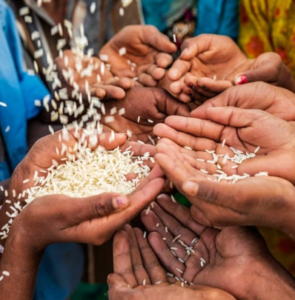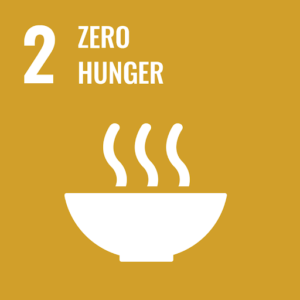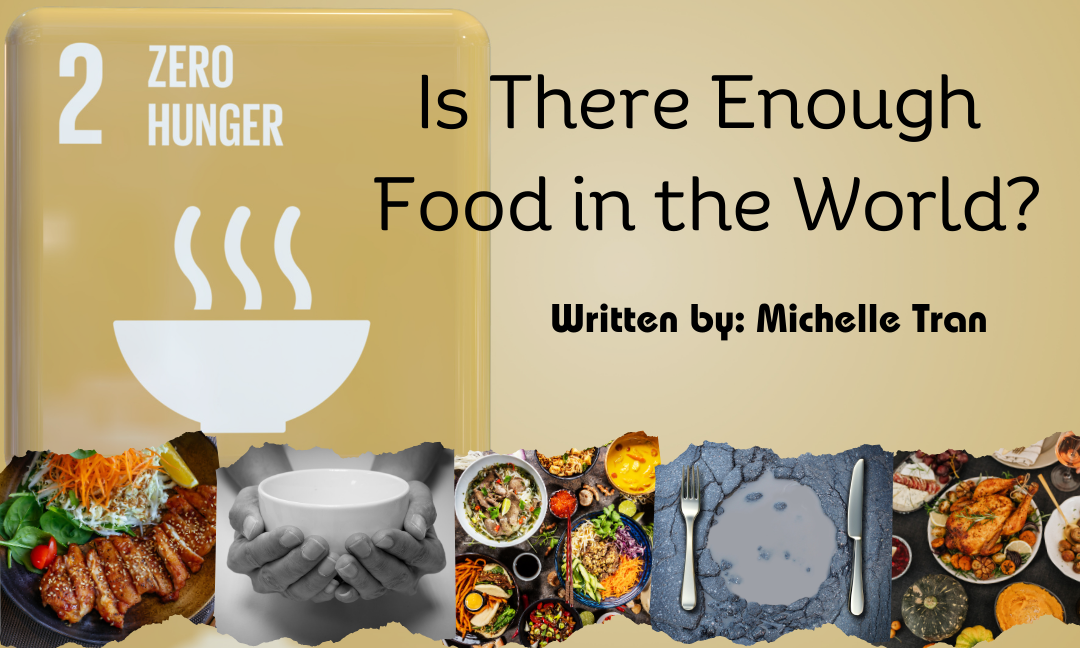Written by: Michelle Tran
Edited by: Nehaa Kousihan
Designed by: Kiya
Published by: Kiya
 The simple answer is, surprisingly yes. There is enough food produced worldwide to feed everyone. Yet 783 million people, or 9.2% of the world’s population still go hungry every day. Nearly one in ten people around the world face hunger each day, a crisis driven largely by conflict, climate change, and inequality (Action Against Hunger, 2023).
The simple answer is, surprisingly yes. There is enough food produced worldwide to feed everyone. Yet 783 million people, or 9.2% of the world’s population still go hungry every day. Nearly one in ten people around the world face hunger each day, a crisis driven largely by conflict, climate change, and inequality (Action Against Hunger, 2023).
What is Hunger?
Generically, hunger is the failure to have food to eat. However, hunger is much more complex than just that aspect. Hunger crisis surrounds many global issues like poverty, discrimination, conflict, weak food and health systems, and inefficient government control.
Hunger can be described as:
- Lack of food and nutrition – fewer than 1800 calories consumed per day.
- Malnutrition – Imbalance Nutrition
- Undernutrition – not enough nutrition causing deficiency in energy, protein, vitamins, and minerals.
- Overnutrition – excessive digestion of nutrients causing nutrition to be imbalanced
- Food Security – inability to access food, causing individuals to be unable to live a safe, active, and healthy life.
The hunger crisis continues to surge yearly worldwide (United Nations, 2015). Hunger affects many different factors in physical and mental health, which is why more action and impact are called to end world hunger.
Why Do People Face Hunger?
More than 3 billion people in the world are unable to afford a healthy meal each day. (Action Against Hunger, 2023).
Many face hunger due to:
- Inflation – rise in cost of living.
- Poverty – unable to pay for living expenses.
- Inequality – discrimination or racism-based identity.
- Conflict – worldwide conflicts affecting the cost of living or the safety of the living environment.
- Climate Change – change in the area’s climate affecting foods from growing, being harvested, and production.
- Weak Government System – disorganized, unreliable, insufficient, etc… nation leaders.
- Weak Health System – unreliable medical care system.
- Inefficient Food Production – production decreasing due to the factors above.
What Happens When People Go Hungry?
When members of our community go hungry, it affects everyone. A world with zero hunger can assist in economies, physical and mental health, education, equality and worldly development.

When we make efforts to reduce hunger, not only will hunger reduce but poverty, food security, lack of employment and insufficient building resilience will decrease. (United Nations, 2015).
Until we make these efforts, many will continue suffering from the consequences of hunger. For example, malnutrition, which is the imbalance of nutrition in the human body, is one of the many health problems that come with hunger. Many more can spark once one is vulnerable to the hunger crisis.
What About Canada?
Hunger can affect anyone at any time. The crisis is much closer than we think it is. In Canada, there were 1,935,911 visits to Canadian food banks, which was up 32% compared to last year. 33% of food banker users were children (Food Banks Canada, March 2023).
Canada has faced alarming rises in inflation over the past years due to many challenges, including the COVID-19 pandemic.
Food Banks Canada statistics show that food bank users consist of:
- 33% Children
- 43.8% Single Adults
- 8% Seniors
- 42.4% Social or Disability Assistance As Primary Income
- 1 in 6 Food Bank Users Are Employed
Canada is identified as a first-world country, along with the United States, Canada, Japan, and many other Western European countries. Yet many in these countries still face hunger despite the countries having a high and developed economy. The majority of people in the world live in second or third-world countries, but if the conditions in first-world countries are already bad, think about them in undeveloped countries.
However, the country one lives in does not affect whether the person may face hunger in their lifetime, as anyone anywhere is vulnerable to hunger at any given moment. With the high rates of inflation in Canada, many more will be forced to resort to food banks.
What Can We Do?

United Nations Goal 2 – Zero Hunger
The United Nations (UN) has a set of 17 goals which they label as “Sustainable Development Goals”. The Zero Hunger goal is to ensure a world free of hunger by 2030.
At the United Nations, they’re working to make zero hunger a reality in our world. Many commitments have come into play including investments, transformations, and protection in how we operate our world. Many changes in helping our world have already been established, and hopefully, many more are here to come.
Youth in Food Systems
At YFS, we work to create opportunities for high school-age youth to connect with food systems through youth-driven, self-directed remote and in-person projects. We work to advocate and educate youth about how food systems impact the world and the significance they hold behind them. With YFS’s student-led projects, youth can express their thoughts and concerns about issues like these occurring in the world.
This blog, for example, is just one of the many ways volunteers at YFS can spread awareness about issues going around the world.
A great way to make an impact is to advocate with your local school or business about the situation, spreading further awareness of the hunger issues many face today.
We can work to end hunger, as everyone deserves to be fed, and everyone has the capability of being fed. Hunger should not be an issue for any, and together we can end the crisis once and for all.
References
Action Against Hunger. (2023). What Causes Hunger?. Action Against Hunger.
https://www.actionagainsthunger.org/the-hunger-crisis/the-causes-of-hunger/
Action Against Hunger. (2023). World Hunger Facts. Action Against Hunger.
https://www.actionagainsthunger.org/the-hunger-crisis/world-hunger-facts/
CFI Team. (n.d.). First World. Corporate Finance Institution.
https://corporatefinanceinstitute.com/resources/economics/first-world/
Food Banks Canada. (2023). Hunger In Canada. Food Banks Canada.
https://foodbankscanada.ca/hunger-in-canada/
Hudes, H. (2023, October 6). Need a reminder of food inflation? Look no further than your
Thanksgiving dinner. CBC News. https://www.cbc.ca/news/business/food-inflation-thanksgiving-1.6989053
United Nations. (2015). Goal 2: Zero Hunger. United Nations Sustainable Development Goals.
https://www.un.org/sustainabledevelopment/hunger/
Photo Credits
- hadynyah on Canva
- United Nations Sustainable Development Goals
- Aman Shankar on PixaHive

